鲁教版(五四制)九年级全册Unit 7 Life is full of the unexpected. Section A 3a~4c课件(共51张PPT)
文档属性
| 名称 | 鲁教版(五四制)九年级全册Unit 7 Life is full of the unexpected. Section A 3a~4c课件(共51张PPT) |
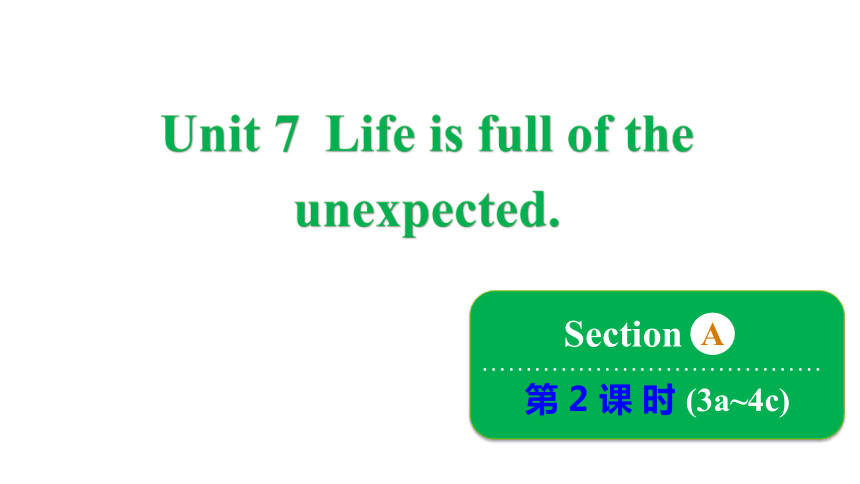
|
|
| 格式 | pptx | ||
| 文件大小 | 2.1MB | ||
| 资源类型 | 教案 | ||
| 版本资源 | 鲁教版 | ||
| 科目 | 英语 | ||
| 更新时间 | 2024-05-03 00:00:00 | ||
图片预览

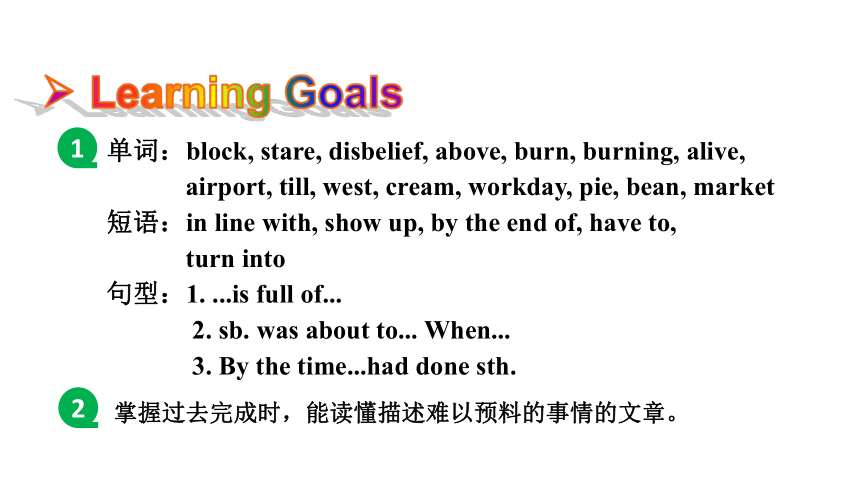
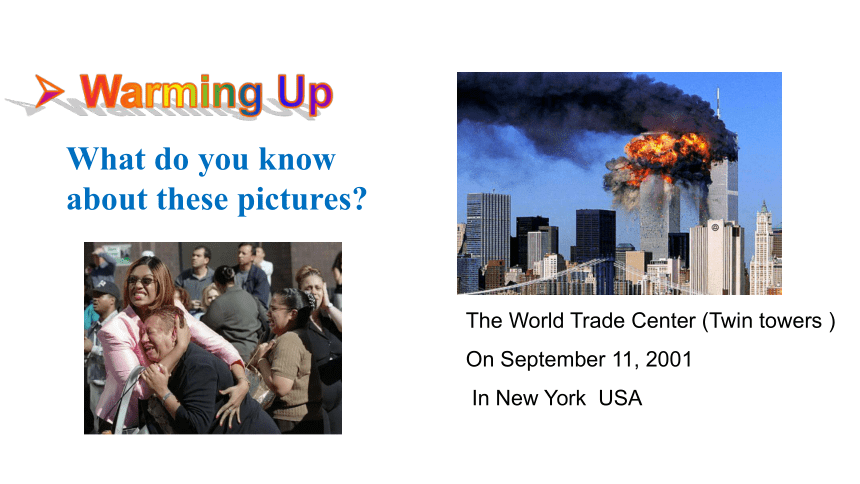
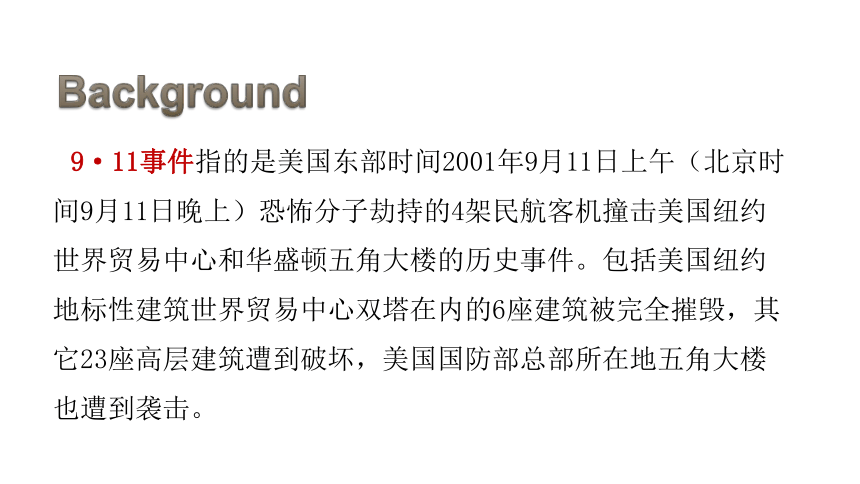
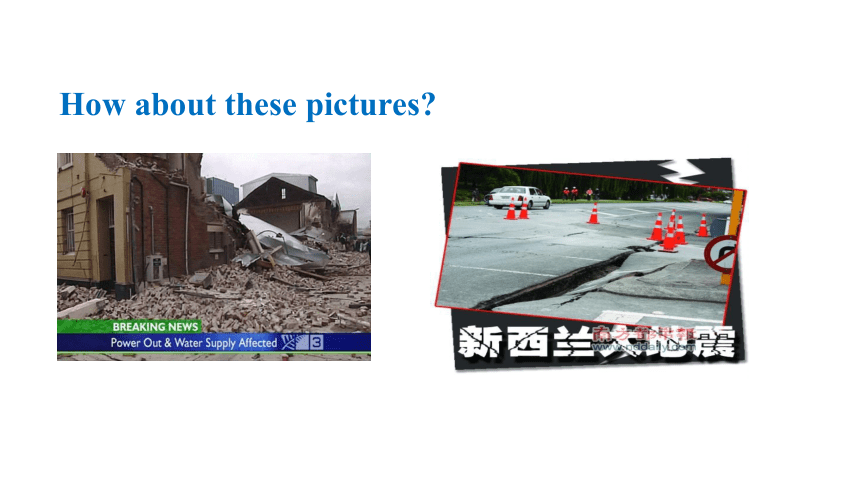

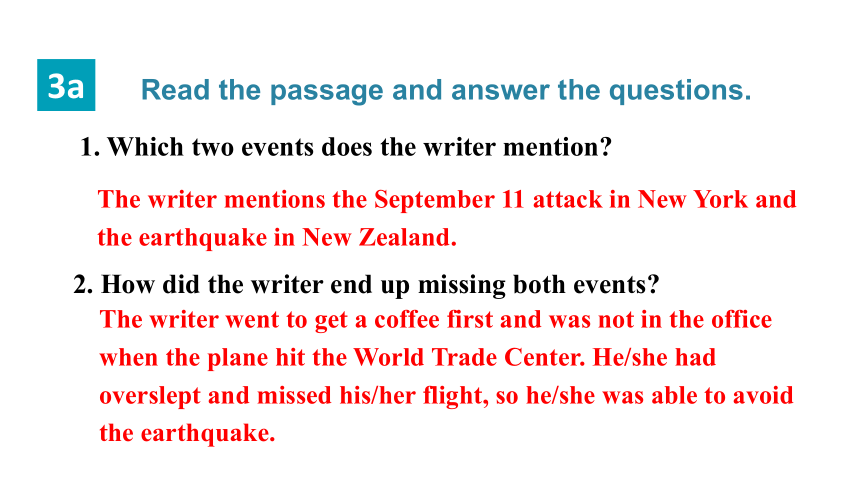
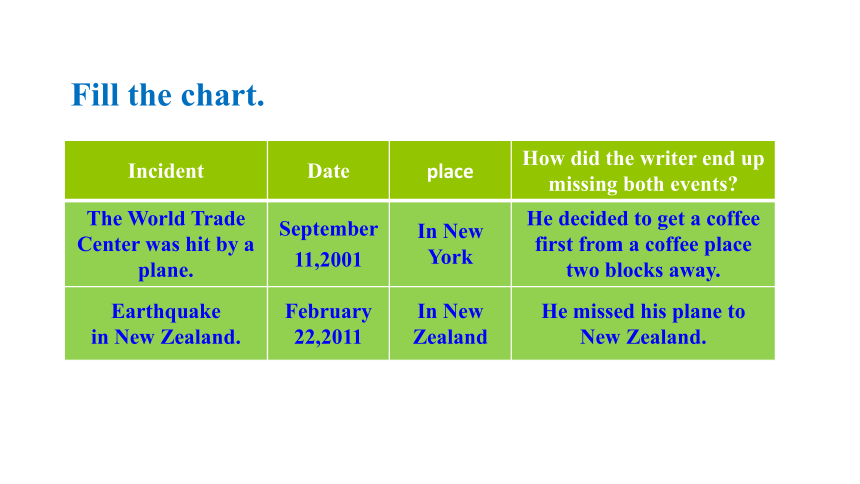
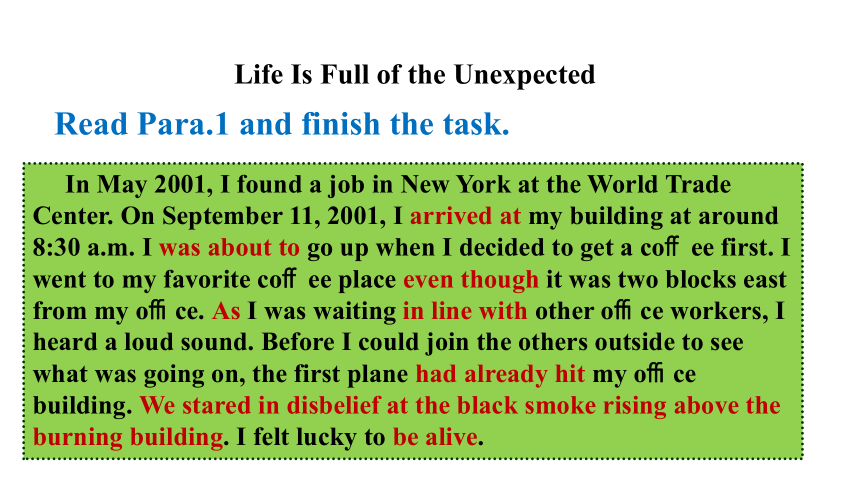

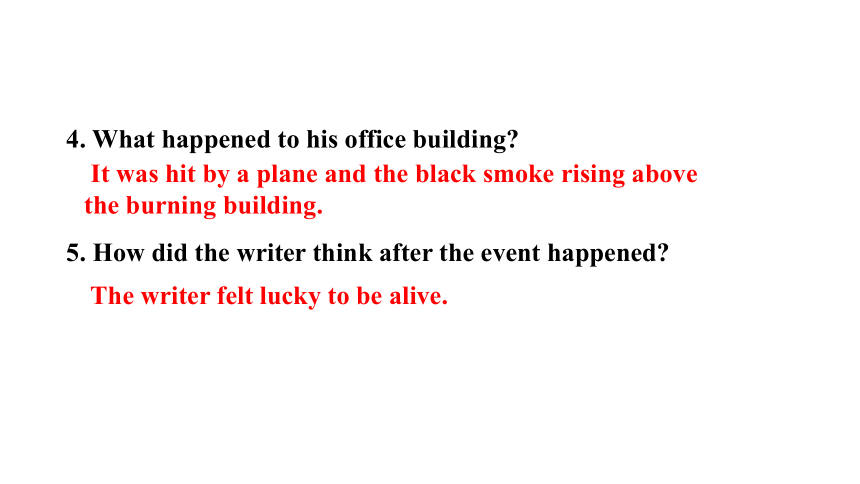
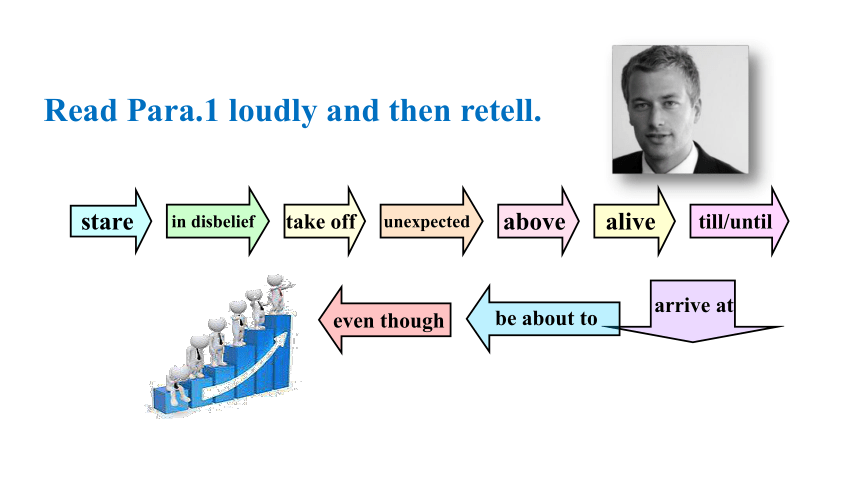
文档简介
(共51张PPT)
Section
第 2 课 时 (3a~4c)
…………………………………
A
Unit 7 Life is full of the unexpected.
单词:block, stare, disbelief, above, burn, burning, alive,
airport, till, west, cream, workday, pie, bean, market
短语:in line with, show up, by the end of, have to,
turn into
句型:1. ...is full of...
2. sb. was about to... When...
3. By the time...had done sth.
Learning Goals
1
2
掌握过去完成时,能读懂描述难以预料的事情的文章。
What do you know about these pictures
Warming Up
The World Trade Center (Twin towers )
On September 11, 2001
In New York USA
9·11事件指的是美国东部时间2001年9月11日上午(北京时间9月11日晚上)恐怖分子劫持的4架民航客机撞击美国纽约世界贸易中心和华盛顿五角大楼的历史事件。包括美国纽约地标性建筑世界贸易中心双塔在内的6座建筑被完全摧毁,其它23座高层建筑遭到破坏,美国国防部总部所在地五角大楼也遭到袭击。
Background
How about these pictures
2·22新西兰克莱斯特彻奇地震
2011年2月22日中午12时51分,新西兰第二大城市克莱斯特彻奇发生里氏6.3级强烈地震,震源深度距离地表仅有4公里。新西兰警方表示,地震共造成182人遇难,成为新西兰80年来死伤最为惨重的地震。
Read the passage and answer the questions.
1. Which two events does the writer mention
The writer mentions the September 11 attack in New York and
the earthquake in New Zealand.
2. How did the writer end up missing both events
The writer went to get a coffee first and was not in the office when the plane hit the World Trade Center. He/she had overslept and missed his/her flight, so he/she was able to avoid the earthquake.
3a
Fill the chart.
Incident Date place How did the writer end up missing both events
The World Trade Center was hit by a plane. September 11,2001 In New York He decided to get a coffee first from a coffee place two blocks away.
Earthquake in New Zealand. February 22,2011 In New Zealand He missed his plane to New Zealand.
In May 2001, I found a job in New York at the World Trade Center. On September 11, 2001, I arrived at my building at around 8:30 a.m. I was about to go up when I decided to get a co ee first. I went to my favorite co ee place even though it was two blocks east from my o ce. As I was waiting in line with other o ce workers, I heard a loud sound. Before I could join the others outside to see what was going on, the first plane had already hit my o ce building. We stared in disbelief at the black smoke rising above the burning building. I felt lucky to be alive.
Life Is Full of the Unexpected
Read Para.1 and finish the task.
Read Para.1 carefully and answer the questions.
1. What time did the writer arrive at World Trade Center on
September 11, 2001
2. What did the writer decide to do first
3. How far away was the coffee place from his office
The writer arrived at World Trade Center at around 8:30 a.m.
The writer decide to get a coffee first.
It was two blocks east from his office.
It was hit by a plane and the black smoke rising above the burning building.
The writer felt lucky to be alive.
4. What happened to his office building
5. How did the writer think after the event happened
stare
in disbelief
take off
unexpected
above
alive
till/until
arrive at
be about to
even though
Read Para.1 loudly and then retell.
Read Para.2 and finish the task.
Almost 10 years later, I woke up at 10:00 a.m. on February 21, 2011 and realized that my alarm never gone o . I jumped out of bed and went straight to the airport. But by the time I got to the airport, my plane to New Zealand had already taken o . “This is the first holiday I’ve taken in a year, and now I ’ve missed my plane. What bad luck!” I thought to myself. The other planes were full so I had to wait till the next day. The next morning, I heard about the earthquake in New Zealand the day before. My bad luck had unexpectedly turned into a good thing.
Make the correct order of the following sentences.
I woke up at 10:00 a.m. on February 21, 2011 and realized that my alarm never went off.
By the time I got to the airport, my plane to New Zealand the day before.
The next morning, I heard about the earthquake in New Zealand had already taken off.
The other planes were full so I had to wait till the next day.
I jumped out of bed and went straight to the airport.
1
3
5
4
2
Read Para.2 carefully and summarize.
When (event)
Where (event)
What (writer)
How (writer)
February 21, 2011
New Zealand
By the time I got to the airport, my plane to New Zealand had already taken off. And the other planes were full so I had to wait till the next day.
His bad luck had unexpectedly turned into
a good thing.
woke up late
alarm had never gone off
jumped out the bed
plane had taken off
went straight to the airport
missed the plane
waited till the next morning
effect(结果)
cause(原因)
①
②
③
④
⑤
⑥
Read Para.2 loudly and then retell.
I was about to go up when I decided to get a coffee first. 正要上楼的时候,我决定先去喝一杯咖啡。
be about to意为 “忙于;即将做某事” ;侧重于表示动作马上就要发生。常与when引导的从句连用,但不与具体的时间状语连用 。
※ The plane is about to take off. 飞机马上就要起飞了。
※ One of my friends is about to have her second baby.
我的一个朋友马上就要生第二个小孩了。
Language points
2. I went to my favorite coffee place even though it was two
blocks east from my office. 我去了我最喜欢的咖啡馆,尽管它在我办公室东边两条街的地方。
even though 意为“即使, 虽然, 尽管”,用于引导让步状语从句。
※ His mind was clear even though he was very ill.
尽管病得厉害,但他头脑仍很清楚。
※ He’s the best teacher, even though he has the least experience.
他虽然经验最少,却是最好的老师。
block为名词,意为“街区”。
3. We stared in disbelief at the black smoke rising above the burning building. 我们难以置信地盯着燃烧的大楼上空升起的黑烟。
stare为动词,意为“盯着看, 凝视”。表示看得比较仔细,有时候也带有吃惊的意味去看,常与at、into连用。
※ Don’t stare at me like that. 别那样盯着我看。
in disbelief 意为“不相信 ,疑惑, 怀疑”。
※Tamara stared at him in disbelief, shaking her head.
塔玛拉一边狐疑地盯着他看,一边摇着头。
※She looked at him in disbelief. 她全然不信地看着他。
above 介词,意为“在……正上方;高于”,表示位置,与 below相对。
※ That big high-rise above us is where Brian lives.
我们上面的那座摩天大楼就是布赖恩住的地方。
※ He lifted his hands above his head. 他将双手举过头顶。
① above作介词,还可表示在地位、级别、能力、资历、重要性等方面“超过,在……之上,比……强”。
※ He is above the others in ability. 他的能力优于其他人。
※ He is above me in every way. 他各个方面都比我强。
② above还可作副词,意为“在上面”。
※ There are snowy peaks above.上面是白雪皑皑的群峰。
※ See the examples given above. 见上述例子。
拓展
burn 动词,意为“着火,燃烧”。其过去式和过去分词分别为burnt、burnt或burned、burned。burning为形容词,意为“着火的;燃烧的”。
※ Ouch! The sand is so hot! It can burn my feet.
哎哟!沙子这么烫!会烫伤脚的。
※ He was trapped in a burning house.
他被困在正在燃烧的房屋里。
alive 意为“活(着)的;在世的;(继续)存在的”,是形容词, 侧重说明生与死之间的界限,既可指人,也可指物。
一般作表语;也可以作后置定语或宾补。 反义词是dead。
※ Do you know she’s alive 你知道她还活着吗?
※ People alive should try their best to live better.
活下来的人应该尽力生活得更好。
※ Tom was kept alive in the big fire.
汤姆在这次大火中活下来了。
后置定语
宾语补足语
4. I felt lucky to be alive.能够活着,我感到幸运。
alive 可作表语,也可作后置定语。不能作前置定语
living “活着的”,强调说明“尚在人间”,“健在”,可用来指人或物,作定语或表语。
live 意为“活的”,通常指物,不指人,常用作定语放在名词的前面。
还指“实况转播的”。
lively 意为“活泼的”,“活跃热情的”,“充满活力的”,可作定语、表语或宾补,既可指人,又可指物。
※ The hunters caught a lion alive. 猎人们活捉了一头狮子。
※ The famous writer is still living. 那位著名的作家仍然健在。
※ He said he had seen a live whale. 他说他看见过活鲸。
※ Jenny is a lively girl. 珍妮是个活泼的女孩。
辨析
5. But by the time I got to the airport, my plane to New Zealand had already taken off. 但是当我到达机场的时候,我乘坐的飞往新西兰的飞机已经起飞了。
take off 意为“脱掉; 起飞”。
※ He took off his hat and bowed as he passed. 他经过时脱帽鞠躬。
※ We eventually took off at 11 o’clock and arrived in Venice at 1:30. 我们终于在11点起飞,1:30 到达威尼斯。
Find words from the passage with opposite meanings to the words below. Then write a sentence with each word.
1. lost:
2. west:
3. below:
4. dead:
5. empty:
found
east
above
alive
full
1. I found the money on the floor.
2. The sun rises in the east.
3. There was a large bird flying above us.
4. His family was so happy to hear he was still alive.
5. The train was so full that I couldn’t get on the
train at all.
3b
Retell one of the events to your partner.
Use these words and phrases to help you.
Stare in disbelief take off unexpected burn above
alive till/until arrive at be about to even though
e.g. On September 11, 2001, I arrived at my...
3c
When I got to school, I realized that I had left my backpack at home.
By the time I got back to school, the bell had rung.
Before I got to the bus stop, the bus had already left.
I was about to go up to my office when I decided to get a coffee first.
As I was waiting in line with the other office workers, I heard a loud sound.
Grammar Focus
过去完成时
一、定义
过去完成时表示某一动作或状态在过去某一时间或动作之前已
经发生或完成,也可以指过去的动作延续到过去的某一时刻,它
表示发生的时间是“过去的过去”。
二、结构
“had +动词的过去分词”(had 通用于各种人称)
过去的过去
过去某时
现在
将来
过去完成时
三、句型结构
肯定/否定句:主语+had/hadn’t+过去分词+…
一般疑问句:Had +主语+过去分词…?
(Yes, 主语+had. / No, 主语+hadn’t.)
特殊疑问句:疑问词+had +主语+过去分词+…?
四、过去完成时的判断依据:
由时间状语来判定:
表示动作从过去持续到过去一段时间。与过去完成时连用的时间状语有:
by + 过去的时间点。
※ I had finished reading the novel by nine o'clock last night.
昨天晚上九点前我已经读完这本小说了。
(2) by the end of + 过去的时间点。
※ We had learned over two thousand English words by the end of
last term. 截止到上学期末,我们已经学了两千多个英文单词了。
(3) before + 过去的时间点。
※ They had planted six hundred trees before last Wednesday.
上周三以前他们已经中了六百棵树了。
2. 由“过去的过去”来判定:
过去完成时表示“过去的过去”,是指过去某一动作之前已经发生或完成的动作,即动作有先后关系,动作在前的用过去完成时,在后的用一般过去时。这种用法常出现在宾语从句中: 当宾语从句的主句为一般过去时,且从句的动作先于主句的动作时,从句要用过去完成时。在told, said, knew, heard, thought等动词后的宾语从句。
※ She said that she had seen the film before.
她说她以前看过这电影。
1. 过去完成时与一般过去时的区别
一般过去时表示过去时间内发生的动作或存在的状态;过去完成时主要体现过去发生的两个动作先后有别,即比过去发生的某动作还要“过去”,两个动作中先发生的是过去完成时,后发生的则只用一般过去时。
※ She lived in New York.她住在纽约。
※ She had lived in New York for 8 years before she came to China.
她在来中国之前已经在纽约住了8年。
易混辨析
2. 过去完成时与现在完成时的区别
现在完成时强调对现在的影响或结果;而过去完成时强调对过去的影响或结果。
※ I have been to Beijing twice. (到现在为止)我去过北京两次。
※ I had been to Beijing twice by the end of last year. 到去年年底,
我已经去过北京两次了。
3. 时态的判定
(1) 主句为一般过去时,宾语从句中的动作表示已完成时常用过去完成时。
※ Amy told me that she had worked in the hospital for 5 years.
埃米告诉我,她已经在那家医院工作5年了。
※ He told me that he had told Mary about the meeting already.
他告诉我,他已经把有关会议的事情告诉了玛丽。
(2) 状语从句中: 在时间、条件、原因、方式等状语从句中,主、从句的动作发生有先后关系,动作在前的,要用过去完成时,动作在后的要用一般过去时。
※ When I got to the station, the train had already left.
当我到达车站时,火车已经离开了。
※ After he had finished his homework, he went to bed.
他完成作业以后,就上床睡觉了。
(3) 有时句子中没有明显的时间状语,动作发生的时间先后需根据上下文判断。
※ Her whole family were pleased with her. She had just won the
first place in the game.
她的全家人为她感到高兴,因为她刚在比赛中获得了第一名。
用所给词的适当形式填空。
1. When I got there the bus ___________ (go).
2. By the time I got to class, the teacher ____________(start) teaching.
3. We ____________ (learn) over 1, 000 words by the end of last term.
4. I ___________ (clean) the room before he arrived here.
had gone
had started
had learnt
had cleaned
Practice
Make sentences using by the time or before.
4a
Tim went into the bedroom.
May got up.
2.The coffee became cold.
I put cream in the coffee.
3. The teacher collected the math homework.
I got to school.
4. I completed the work for my boss.
The workday ended.
5. The movie started.
I arrived at the cinema.
6. My mother finished making the apple pie.
I got home from my language course.
1. By the time Mary got up, Tim had already gone into the bathroom.
2. Before I could put cream in the coffee, the coffee had become cold.
3. By the time I got to school, the teacher had collected the math homework.
4. I had completed the work for my boss before the workday ended.
5. The movie had started before I arrived at the cinema.
6. By the time I got home from my language course, my mother had finished making the apple pie.
Fill in the blanks with the correct forms of the words in the box.
rush out forget arrive at
go into show up find out
By the time I arrived at the party, everyone else_______ already ____________ .
2.When he put the noodles into a bowl, he realized he ________________to add the green beans.
3. By the time my mother came back from the market, I _______already_____________ of the door to go to my piano lesson.
had
shown up
had forgotten
rushed out
had
4b
4. Before she got to the airport, she _____________ about the earthquake.
5. When she __________ the movie theater, she remembered she had forgotten to feed her dog.
6. Before she got a chance to say goodbye, he ____________ the building.
had forgotten
arrived at
had gone into
Write two true statements and one false statement about your day yesterday. Then ask your classmates to guess the false statement.
By the time I left for school in the morning, _____________________________________.
By the end of the school day, ________________________________.
By dinner time, I _____________________.
I saw my teacher clean the classroom
I missed my schoolmates so much
ate a fish
4c
I.根据汉语提示写出下面句中所缺的单词。
1. I got up early this morning because I didn’t want to _______ (错过) the early bus.
2. The drop in prices was quiet ___________ (出乎意料的).
3. The ______ (工人) fell down and got hurt.
4. The plane was flying _______ (在上面) the clouds.
5. The river goes through the city from ______ (西) to east.
miss
unexpected
worker_
above
west
Practice
1. By the time I got to Tom’s house, he __________ (go) out.
had gone
2. Annie told me that his father ________ ( go ) to Paris and
he ____________ ( come ) back in a few days.
had gone
would come
3. My friend __________ (buy) the car two years ago.
He ____________ (buy) it for two years.
bought
has had
Ⅱ.用所给词的适当形式填空。
Ⅲ.根据汉语意思完成句子,每空一词。
1. 我在动物园里见过活鳄鱼。
I have seen a _______ crocodile in the zoo.
2. 他是那场火灾中唯一活下来的人。
He is the only person ______ in the fire.
3. 露西是个活泼的孩子, 大家都喜欢她。
Lucy is a _______ child and everyone likes her.
living
alive
lively
4. 飞机就要起飞了。
The plane ____ about ____ _____ _____.
5. 不用盯着他看。
Don’t ______ ______ him.
6.他直到7点钟才能到机场。
He didn't get to ______ ______ ______ 7:00 a.m.
is to take off
stare at
the airport until
1. He was unhappy when he sold his guitar. After all,
he ______ it for a very long time.
A. has had B. had had
C. has D. had
2. I ______ 900 English words by the time I was ten.
A. learned B. was learning
C. had learned D. learnt
IV. 单项选择。
B
D
Homework
Review 3a and Grammar Focus.
Review the content in Grammar Focus. Try to make sentences with before, by the time and be doing…when, and make use of the past perfect tense.
Preview the new words in Section B.
Section
第 2 课 时 (3a~4c)
…………………………………
A
Unit 7 Life is full of the unexpected.
单词:block, stare, disbelief, above, burn, burning, alive,
airport, till, west, cream, workday, pie, bean, market
短语:in line with, show up, by the end of, have to,
turn into
句型:1. ...is full of...
2. sb. was about to... When...
3. By the time...had done sth.
Learning Goals
1
2
掌握过去完成时,能读懂描述难以预料的事情的文章。
What do you know about these pictures
Warming Up
The World Trade Center (Twin towers )
On September 11, 2001
In New York USA
9·11事件指的是美国东部时间2001年9月11日上午(北京时间9月11日晚上)恐怖分子劫持的4架民航客机撞击美国纽约世界贸易中心和华盛顿五角大楼的历史事件。包括美国纽约地标性建筑世界贸易中心双塔在内的6座建筑被完全摧毁,其它23座高层建筑遭到破坏,美国国防部总部所在地五角大楼也遭到袭击。
Background
How about these pictures
2·22新西兰克莱斯特彻奇地震
2011年2月22日中午12时51分,新西兰第二大城市克莱斯特彻奇发生里氏6.3级强烈地震,震源深度距离地表仅有4公里。新西兰警方表示,地震共造成182人遇难,成为新西兰80年来死伤最为惨重的地震。
Read the passage and answer the questions.
1. Which two events does the writer mention
The writer mentions the September 11 attack in New York and
the earthquake in New Zealand.
2. How did the writer end up missing both events
The writer went to get a coffee first and was not in the office when the plane hit the World Trade Center. He/she had overslept and missed his/her flight, so he/she was able to avoid the earthquake.
3a
Fill the chart.
Incident Date place How did the writer end up missing both events
The World Trade Center was hit by a plane. September 11,2001 In New York He decided to get a coffee first from a coffee place two blocks away.
Earthquake in New Zealand. February 22,2011 In New Zealand He missed his plane to New Zealand.
In May 2001, I found a job in New York at the World Trade Center. On September 11, 2001, I arrived at my building at around 8:30 a.m. I was about to go up when I decided to get a co ee first. I went to my favorite co ee place even though it was two blocks east from my o ce. As I was waiting in line with other o ce workers, I heard a loud sound. Before I could join the others outside to see what was going on, the first plane had already hit my o ce building. We stared in disbelief at the black smoke rising above the burning building. I felt lucky to be alive.
Life Is Full of the Unexpected
Read Para.1 and finish the task.
Read Para.1 carefully and answer the questions.
1. What time did the writer arrive at World Trade Center on
September 11, 2001
2. What did the writer decide to do first
3. How far away was the coffee place from his office
The writer arrived at World Trade Center at around 8:30 a.m.
The writer decide to get a coffee first.
It was two blocks east from his office.
It was hit by a plane and the black smoke rising above the burning building.
The writer felt lucky to be alive.
4. What happened to his office building
5. How did the writer think after the event happened
stare
in disbelief
take off
unexpected
above
alive
till/until
arrive at
be about to
even though
Read Para.1 loudly and then retell.
Read Para.2 and finish the task.
Almost 10 years later, I woke up at 10:00 a.m. on February 21, 2011 and realized that my alarm never gone o . I jumped out of bed and went straight to the airport. But by the time I got to the airport, my plane to New Zealand had already taken o . “This is the first holiday I’ve taken in a year, and now I ’ve missed my plane. What bad luck!” I thought to myself. The other planes were full so I had to wait till the next day. The next morning, I heard about the earthquake in New Zealand the day before. My bad luck had unexpectedly turned into a good thing.
Make the correct order of the following sentences.
I woke up at 10:00 a.m. on February 21, 2011 and realized that my alarm never went off.
By the time I got to the airport, my plane to New Zealand the day before.
The next morning, I heard about the earthquake in New Zealand had already taken off.
The other planes were full so I had to wait till the next day.
I jumped out of bed and went straight to the airport.
1
3
5
4
2
Read Para.2 carefully and summarize.
When (event)
Where (event)
What (writer)
How (writer)
February 21, 2011
New Zealand
By the time I got to the airport, my plane to New Zealand had already taken off. And the other planes were full so I had to wait till the next day.
His bad luck had unexpectedly turned into
a good thing.
woke up late
alarm had never gone off
jumped out the bed
plane had taken off
went straight to the airport
missed the plane
waited till the next morning
effect(结果)
cause(原因)
①
②
③
④
⑤
⑥
Read Para.2 loudly and then retell.
I was about to go up when I decided to get a coffee first. 正要上楼的时候,我决定先去喝一杯咖啡。
be about to意为 “忙于;即将做某事” ;侧重于表示动作马上就要发生。常与when引导的从句连用,但不与具体的时间状语连用 。
※ The plane is about to take off. 飞机马上就要起飞了。
※ One of my friends is about to have her second baby.
我的一个朋友马上就要生第二个小孩了。
Language points
2. I went to my favorite coffee place even though it was two
blocks east from my office. 我去了我最喜欢的咖啡馆,尽管它在我办公室东边两条街的地方。
even though 意为“即使, 虽然, 尽管”,用于引导让步状语从句。
※ His mind was clear even though he was very ill.
尽管病得厉害,但他头脑仍很清楚。
※ He’s the best teacher, even though he has the least experience.
他虽然经验最少,却是最好的老师。
block为名词,意为“街区”。
3. We stared in disbelief at the black smoke rising above the burning building. 我们难以置信地盯着燃烧的大楼上空升起的黑烟。
stare为动词,意为“盯着看, 凝视”。表示看得比较仔细,有时候也带有吃惊的意味去看,常与at、into连用。
※ Don’t stare at me like that. 别那样盯着我看。
in disbelief 意为“不相信 ,疑惑, 怀疑”。
※Tamara stared at him in disbelief, shaking her head.
塔玛拉一边狐疑地盯着他看,一边摇着头。
※She looked at him in disbelief. 她全然不信地看着他。
above 介词,意为“在……正上方;高于”,表示位置,与 below相对。
※ That big high-rise above us is where Brian lives.
我们上面的那座摩天大楼就是布赖恩住的地方。
※ He lifted his hands above his head. 他将双手举过头顶。
① above作介词,还可表示在地位、级别、能力、资历、重要性等方面“超过,在……之上,比……强”。
※ He is above the others in ability. 他的能力优于其他人。
※ He is above me in every way. 他各个方面都比我强。
② above还可作副词,意为“在上面”。
※ There are snowy peaks above.上面是白雪皑皑的群峰。
※ See the examples given above. 见上述例子。
拓展
burn 动词,意为“着火,燃烧”。其过去式和过去分词分别为burnt、burnt或burned、burned。burning为形容词,意为“着火的;燃烧的”。
※ Ouch! The sand is so hot! It can burn my feet.
哎哟!沙子这么烫!会烫伤脚的。
※ He was trapped in a burning house.
他被困在正在燃烧的房屋里。
alive 意为“活(着)的;在世的;(继续)存在的”,是形容词, 侧重说明生与死之间的界限,既可指人,也可指物。
一般作表语;也可以作后置定语或宾补。 反义词是dead。
※ Do you know she’s alive 你知道她还活着吗?
※ People alive should try their best to live better.
活下来的人应该尽力生活得更好。
※ Tom was kept alive in the big fire.
汤姆在这次大火中活下来了。
后置定语
宾语补足语
4. I felt lucky to be alive.能够活着,我感到幸运。
alive 可作表语,也可作后置定语。不能作前置定语
living “活着的”,强调说明“尚在人间”,“健在”,可用来指人或物,作定语或表语。
live 意为“活的”,通常指物,不指人,常用作定语放在名词的前面。
还指“实况转播的”。
lively 意为“活泼的”,“活跃热情的”,“充满活力的”,可作定语、表语或宾补,既可指人,又可指物。
※ The hunters caught a lion alive. 猎人们活捉了一头狮子。
※ The famous writer is still living. 那位著名的作家仍然健在。
※ He said he had seen a live whale. 他说他看见过活鲸。
※ Jenny is a lively girl. 珍妮是个活泼的女孩。
辨析
5. But by the time I got to the airport, my plane to New Zealand had already taken off. 但是当我到达机场的时候,我乘坐的飞往新西兰的飞机已经起飞了。
take off 意为“脱掉; 起飞”。
※ He took off his hat and bowed as he passed. 他经过时脱帽鞠躬。
※ We eventually took off at 11 o’clock and arrived in Venice at 1:30. 我们终于在11点起飞,1:30 到达威尼斯。
Find words from the passage with opposite meanings to the words below. Then write a sentence with each word.
1. lost:
2. west:
3. below:
4. dead:
5. empty:
found
east
above
alive
full
1. I found the money on the floor.
2. The sun rises in the east.
3. There was a large bird flying above us.
4. His family was so happy to hear he was still alive.
5. The train was so full that I couldn’t get on the
train at all.
3b
Retell one of the events to your partner.
Use these words and phrases to help you.
Stare in disbelief take off unexpected burn above
alive till/until arrive at be about to even though
e.g. On September 11, 2001, I arrived at my...
3c
When I got to school, I realized that I had left my backpack at home.
By the time I got back to school, the bell had rung.
Before I got to the bus stop, the bus had already left.
I was about to go up to my office when I decided to get a coffee first.
As I was waiting in line with the other office workers, I heard a loud sound.
Grammar Focus
过去完成时
一、定义
过去完成时表示某一动作或状态在过去某一时间或动作之前已
经发生或完成,也可以指过去的动作延续到过去的某一时刻,它
表示发生的时间是“过去的过去”。
二、结构
“had +动词的过去分词”(had 通用于各种人称)
过去的过去
过去某时
现在
将来
过去完成时
三、句型结构
肯定/否定句:主语+had/hadn’t+过去分词+…
一般疑问句:Had +主语+过去分词…?
(Yes, 主语+had. / No, 主语+hadn’t.)
特殊疑问句:疑问词+had +主语+过去分词+…?
四、过去完成时的判断依据:
由时间状语来判定:
表示动作从过去持续到过去一段时间。与过去完成时连用的时间状语有:
by + 过去的时间点。
※ I had finished reading the novel by nine o'clock last night.
昨天晚上九点前我已经读完这本小说了。
(2) by the end of + 过去的时间点。
※ We had learned over two thousand English words by the end of
last term. 截止到上学期末,我们已经学了两千多个英文单词了。
(3) before + 过去的时间点。
※ They had planted six hundred trees before last Wednesday.
上周三以前他们已经中了六百棵树了。
2. 由“过去的过去”来判定:
过去完成时表示“过去的过去”,是指过去某一动作之前已经发生或完成的动作,即动作有先后关系,动作在前的用过去完成时,在后的用一般过去时。这种用法常出现在宾语从句中: 当宾语从句的主句为一般过去时,且从句的动作先于主句的动作时,从句要用过去完成时。在told, said, knew, heard, thought等动词后的宾语从句。
※ She said that she had seen the film before.
她说她以前看过这电影。
1. 过去完成时与一般过去时的区别
一般过去时表示过去时间内发生的动作或存在的状态;过去完成时主要体现过去发生的两个动作先后有别,即比过去发生的某动作还要“过去”,两个动作中先发生的是过去完成时,后发生的则只用一般过去时。
※ She lived in New York.她住在纽约。
※ She had lived in New York for 8 years before she came to China.
她在来中国之前已经在纽约住了8年。
易混辨析
2. 过去完成时与现在完成时的区别
现在完成时强调对现在的影响或结果;而过去完成时强调对过去的影响或结果。
※ I have been to Beijing twice. (到现在为止)我去过北京两次。
※ I had been to Beijing twice by the end of last year. 到去年年底,
我已经去过北京两次了。
3. 时态的判定
(1) 主句为一般过去时,宾语从句中的动作表示已完成时常用过去完成时。
※ Amy told me that she had worked in the hospital for 5 years.
埃米告诉我,她已经在那家医院工作5年了。
※ He told me that he had told Mary about the meeting already.
他告诉我,他已经把有关会议的事情告诉了玛丽。
(2) 状语从句中: 在时间、条件、原因、方式等状语从句中,主、从句的动作发生有先后关系,动作在前的,要用过去完成时,动作在后的要用一般过去时。
※ When I got to the station, the train had already left.
当我到达车站时,火车已经离开了。
※ After he had finished his homework, he went to bed.
他完成作业以后,就上床睡觉了。
(3) 有时句子中没有明显的时间状语,动作发生的时间先后需根据上下文判断。
※ Her whole family were pleased with her. She had just won the
first place in the game.
她的全家人为她感到高兴,因为她刚在比赛中获得了第一名。
用所给词的适当形式填空。
1. When I got there the bus ___________ (go).
2. By the time I got to class, the teacher ____________(start) teaching.
3. We ____________ (learn) over 1, 000 words by the end of last term.
4. I ___________ (clean) the room before he arrived here.
had gone
had started
had learnt
had cleaned
Practice
Make sentences using by the time or before.
4a
Tim went into the bedroom.
May got up.
2.The coffee became cold.
I put cream in the coffee.
3. The teacher collected the math homework.
I got to school.
4. I completed the work for my boss.
The workday ended.
5. The movie started.
I arrived at the cinema.
6. My mother finished making the apple pie.
I got home from my language course.
1. By the time Mary got up, Tim had already gone into the bathroom.
2. Before I could put cream in the coffee, the coffee had become cold.
3. By the time I got to school, the teacher had collected the math homework.
4. I had completed the work for my boss before the workday ended.
5. The movie had started before I arrived at the cinema.
6. By the time I got home from my language course, my mother had finished making the apple pie.
Fill in the blanks with the correct forms of the words in the box.
rush out forget arrive at
go into show up find out
By the time I arrived at the party, everyone else_______ already ____________ .
2.When he put the noodles into a bowl, he realized he ________________to add the green beans.
3. By the time my mother came back from the market, I _______already_____________ of the door to go to my piano lesson.
had
shown up
had forgotten
rushed out
had
4b
4. Before she got to the airport, she _____________ about the earthquake.
5. When she __________ the movie theater, she remembered she had forgotten to feed her dog.
6. Before she got a chance to say goodbye, he ____________ the building.
had forgotten
arrived at
had gone into
Write two true statements and one false statement about your day yesterday. Then ask your classmates to guess the false statement.
By the time I left for school in the morning, _____________________________________.
By the end of the school day, ________________________________.
By dinner time, I _____________________.
I saw my teacher clean the classroom
I missed my schoolmates so much
ate a fish
4c
I.根据汉语提示写出下面句中所缺的单词。
1. I got up early this morning because I didn’t want to _______ (错过) the early bus.
2. The drop in prices was quiet ___________ (出乎意料的).
3. The ______ (工人) fell down and got hurt.
4. The plane was flying _______ (在上面) the clouds.
5. The river goes through the city from ______ (西) to east.
miss
unexpected
worker_
above
west
Practice
1. By the time I got to Tom’s house, he __________ (go) out.
had gone
2. Annie told me that his father ________ ( go ) to Paris and
he ____________ ( come ) back in a few days.
had gone
would come
3. My friend __________ (buy) the car two years ago.
He ____________ (buy) it for two years.
bought
has had
Ⅱ.用所给词的适当形式填空。
Ⅲ.根据汉语意思完成句子,每空一词。
1. 我在动物园里见过活鳄鱼。
I have seen a _______ crocodile in the zoo.
2. 他是那场火灾中唯一活下来的人。
He is the only person ______ in the fire.
3. 露西是个活泼的孩子, 大家都喜欢她。
Lucy is a _______ child and everyone likes her.
living
alive
lively
4. 飞机就要起飞了。
The plane ____ about ____ _____ _____.
5. 不用盯着他看。
Don’t ______ ______ him.
6.他直到7点钟才能到机场。
He didn't get to ______ ______ ______ 7:00 a.m.
is to take off
stare at
the airport until
1. He was unhappy when he sold his guitar. After all,
he ______ it for a very long time.
A. has had B. had had
C. has D. had
2. I ______ 900 English words by the time I was ten.
A. learned B. was learning
C. had learned D. learnt
IV. 单项选择。
B
D
Homework
Review 3a and Grammar Focus.
Review the content in Grammar Focus. Try to make sentences with before, by the time and be doing…when, and make use of the past perfect tense.
Preview the new words in Section B.
同课章节目录
- Unit 1 When was it invented?
- Section A
- Section B
- Unit 2 Teenagers should be allowed to choose their
- Section A
- Section B
- Unit 3 It must belong to Carla.
- Section A
- Section B
- Unit 4 I like music that I can dance to.
- Section A
- Section B
- Unit 5 You’re supposed to shake hands.
- Section A
- Section B
- Unit 6 Sad movies make me cry.
- Section A
- Section B
- Unit 7 Life is full of the unexpected.
- Section A
- Section B
- Unit 8 We're trying to save the earth!
- Section A
- Section B
- Unit 9 It's important to have good habits.
- Section A
- Section B
- Unit 10 I remember meeting all of you in Grade 6.
- Section A
- Section B
